Kustomer AI: A 2025 guide to its features, limitations, and a flexible alternative

Stevia Putri

Stanley Nicholas
Last edited November 14, 2025
Expert Verified

You've probably heard of Kustomer. It's made a name for itself as a do-it-all customer service CRM, and like many others, it's investing heavily in artificial intelligence. Their answer is Kustomer AI, a set of tools built right into the platform to automate support, help agents work faster, and keep things running smoothly.
This guide will walk you through everything Kustomer AI has to offer. We'll look at its main parts, like the AI Agents and the no-code AI Agent Studio, get into the pricing, and unpack its biggest catch: you're completely tied to their platform.
Choosing an AI tool isn't just about cool features; it's about whether the benefits are worth the hassle. That's especially true when a tool asks you to move your entire tech stack over, which is a big decision that you shouldn't make lightly.
What is Kustomer AI?
So, what exactly is Kustomer AI? Think of it as a set of artificial intelligence tools built directly into the Kustomer customer service CRM. It's not something you can buy separately and plug into the tools you already use. Instead, it's made to work only inside the Kustomer world.
It's built to do two main things:
-
AI agents for customers: These are bots that can run on their own, offering 24/7 support through email, chat, and voice to solve problems without needing a human.
-
AI agents for reps: This is Kustomer's take on an agent copilot. It gives human agents a hand by summarizing conversations, suggesting replies, and handling wrap-up tasks automatically.
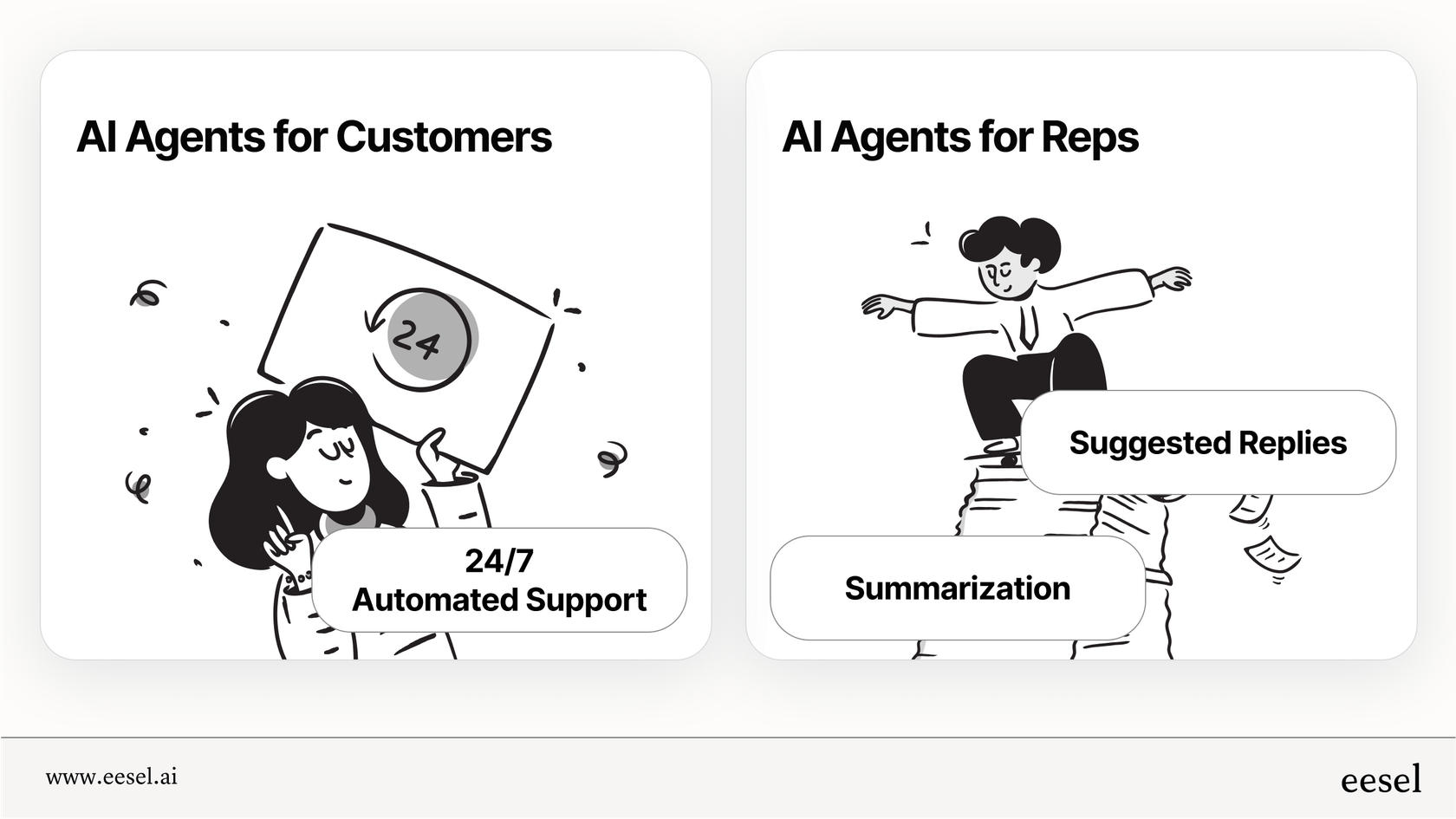
The main takeaway here is that you can't get Kustomer AI without going all-in on Kustomer. To use these features, Kustomer has to be your main helpdesk. If your team is already on the platform, it's a simple add-on. For everyone else, it means you have to switch over completely.
Let's dig into the three pillars of their AI: the agents, the studio for building them, and the omnichannel setup that pulls it all together.
Breaking down the core components of Kustomer AI
Kustomer's AI is built around a few key tools that work together inside its platform. Here's a look at what they are, what they do, and where you might run into trouble.
Kustomer AI agents for customers and reps
Kustomer's AI Agents for Customers are meant to be your first line of support, handling customer questions on their own. They can work across different channels and use data from other sources linked to the Kustomer CRM to find answers.
At the same time, AI Agents for Reps act as a sidekick for your human team. This copilot can sum up long chats, suggest replies based on your knowledge base, and point to the best next step to get things solved faster.
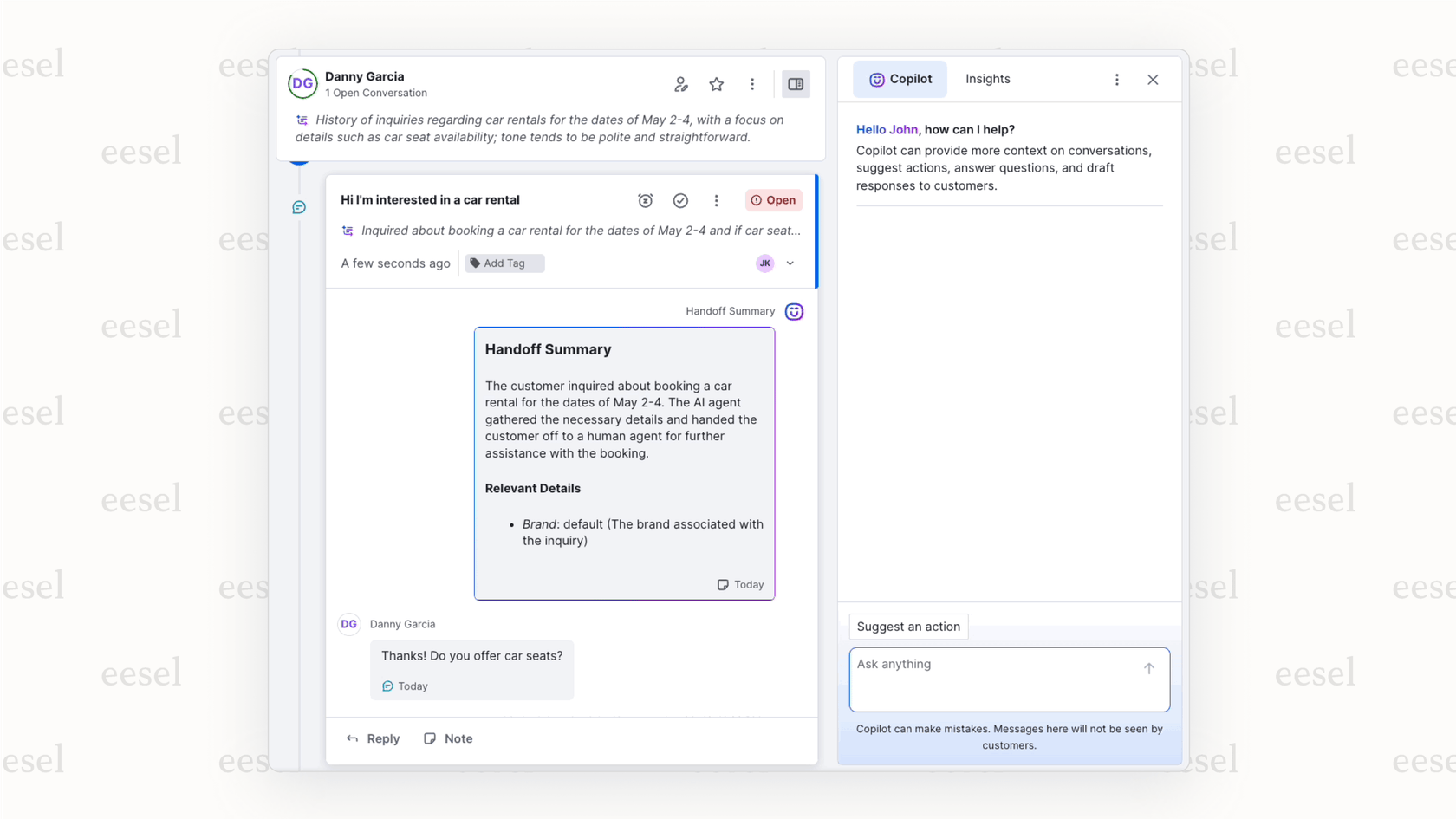
The catch: While these agents are pretty smart, they're stuck inside the Kustomer platform. If your team is happy and working well with a helpdesk like Zendesk, Freshdesk, or Intercom, you're out of luck. Getting Kustomer's AI means ditching the tools you're already using.
Alternative: A different way to go is using a tool that works with the platforms you already have. eesel AI gives you both an autonomous AI Agent for customer-facing support and an AI Copilot to help your human agents. The big difference is that it connects right into the helpdesk you're already using, so you get powerful AI without a costly and disruptive move.
The Kustomer AI agent studio
The AI Agent Studio is Kustomer's no-code tool where you can build, train, and launch your AI agents. It lets you shape the agent's personality, set its tone of voice, create rules to keep it on track, and connect it to your knowledge bases.
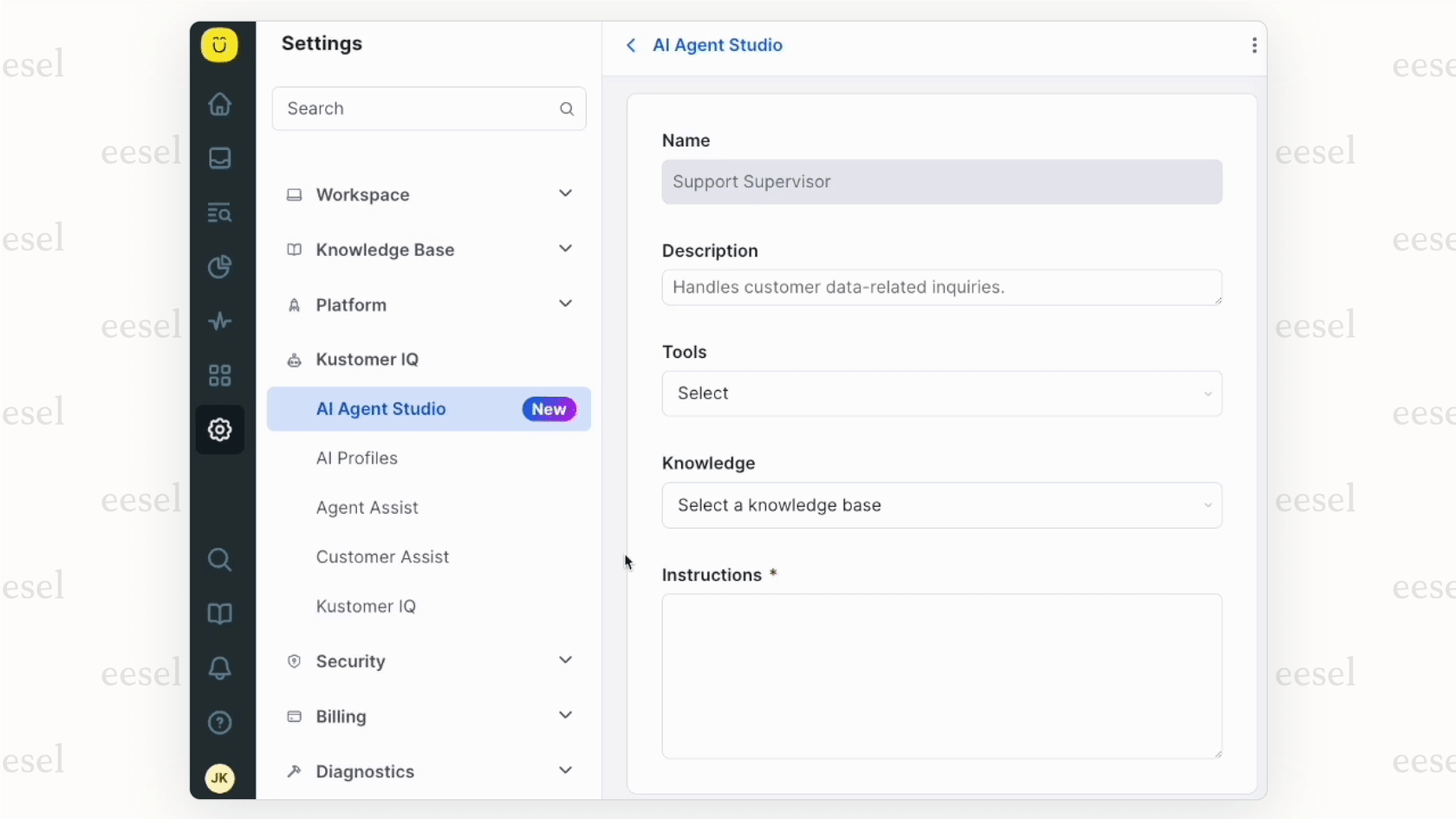
The catch: The studio is easy to use, but it only builds agents that work on the Kustomer platform. On top of that, its knowledge is mostly stuck with whatever you've fed directly into the Kustomer CRM. If your team's real brainpower is spread across documents in different apps, you'll need to pull it all into Kustomer first.
Alternative: By contrast, eesel AI is designed to learn from the tools your team actually uses every day. You can train your AI on knowledge from Confluence, Google Docs, Notion, and other sources. This results in a much smarter and more helpful AI withoutmaking you centralize all your company's information in a new CRM just to get started.
Kustomer AI's native omnichannel integration
One of Kustomer's biggest selling points is its native omnichannel support. Since everything is in one platform, their AI works smoothly across every channel they support, from email and chat to their built-in voice system. This gives both customers and agents a consistent experience.
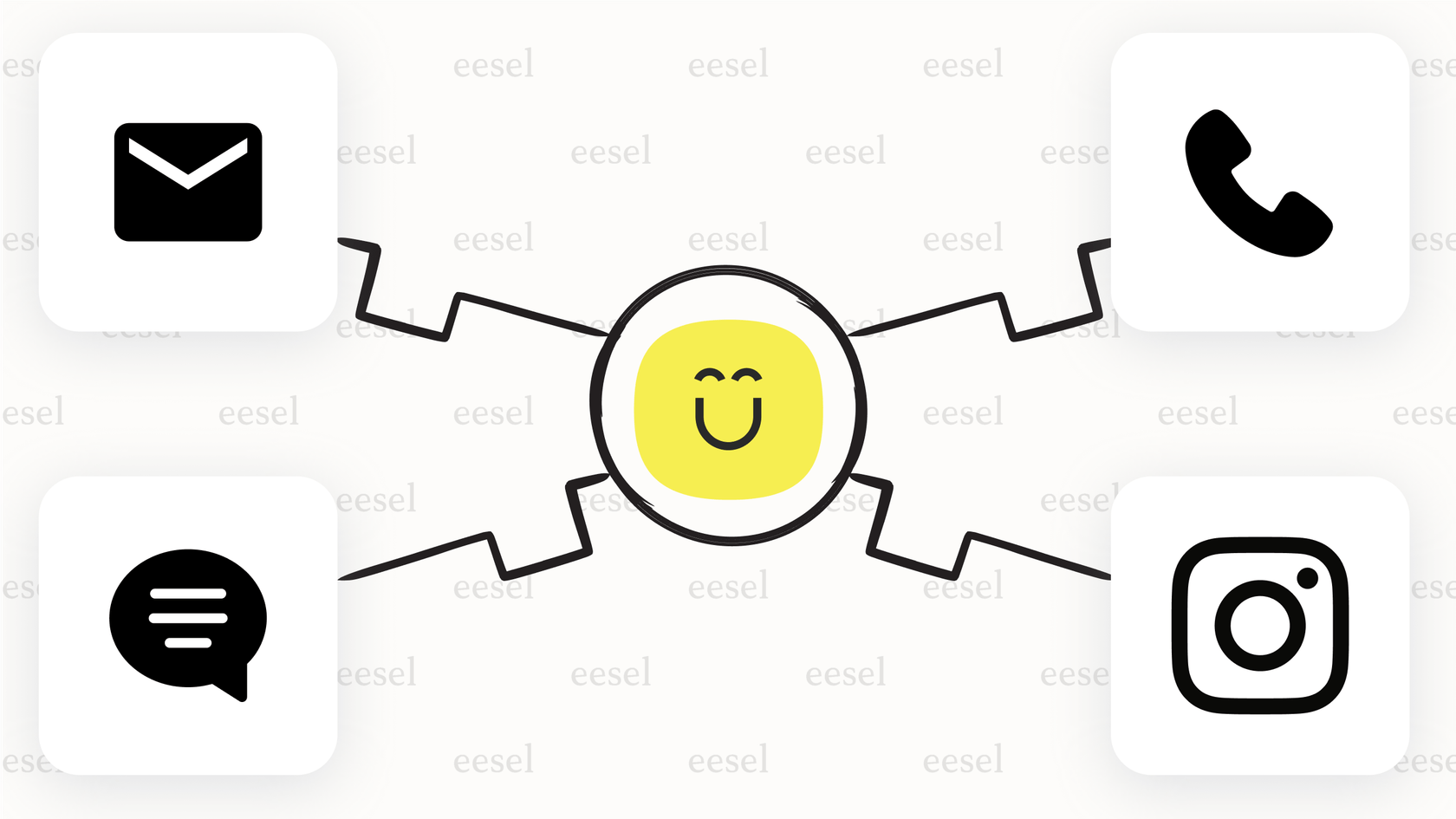
The catch: The value here completely depends on you using Kustomer's channels. But what about getting help internally? If your support agents need to escalate an issue or ask an engineer a question, they're probably jumping over to Slack or Microsoft Teams. This breaks up the workflow and forces agents to leave their main tool to get answers.
Alternative: This is another spot where a layered AI tool really helps. eesel AI is made to connect your customer helpdesk with your internal chat tools. It can answer questions and handle escalations right inside Slack or Teams, keeping your team's workflow connected and smooth.
Understanding Kustomer AI pricing and plans
If you check out Kustomer's pricing page, you'll see two main options: one based on seats and another on conversations. The per-seat prices of $89/month (Enterprise) and $139/month (Ultimate) look simple enough, but the real cost is in the fine print.
The key AI features aren't part of the base plans. To get the full package, you have to pay more:
-
AI Agents for Reps: Starts at $40 per user, per month.
-
AI Agents for Customers: Starts at $0.60 per engaged conversation.
The catch: This mix-and-match pricing can get confusing and costly before you know it. To figure out your total spend, you have to guess your number of seats, estimate your conversation volume, and then pile multiple AI fees on top. Kustomer offers "all-inclusive" bundles to make this easier, but they aren't cheap, starting at $129 per user/month for the Enterprise Bundle. This makes it tough to budget and scale.
Alternative: eesel AI's pricing is much more straightforward. All its main products (AI Agent, AI Copilot, AI Triage, AI Chatbot, and Internal Chat) are included in every plan. The price scales with just one clear number: your monthly AI interactions. This all-in-one approach gets rid of surprise fees, makes budgeting easier, and gives you the whole suite of tools from day one.
| Feature | Kustomer AI Pricing | eesel AI Pricing |
|---|---|---|
| Model | Per-seat or per-conversation with required AI add-ons. | All-inclusive plans based on monthly AI interactions. |
| AI Agent | Add-on ($0.60/conversation). | Included in all plans. |
| AI Copilot | Add-on ($40/user/month). | Included in all plans. |
| Complexity | High. Requires calculating base plan + multiple add-ons. | Low. A single, predictable, usage-based metric. |
| Value | Pay for each AI feature separately. | Access the entire AI suite with one subscription. |
The biggest Kustomer AI drawback: The walled garden approach
This brings us to the biggest catch. The main hurdle for any team looking at Kustomer AI is that you're locked into their platform.
The high cost of Kustomer AI platform lock-in
Choosing Kustomer AI means choosing the entire Kustomer CRM. There's no in-between; it's an all-or-nothing deal. This creates some serious business headaches you can't just ignore:
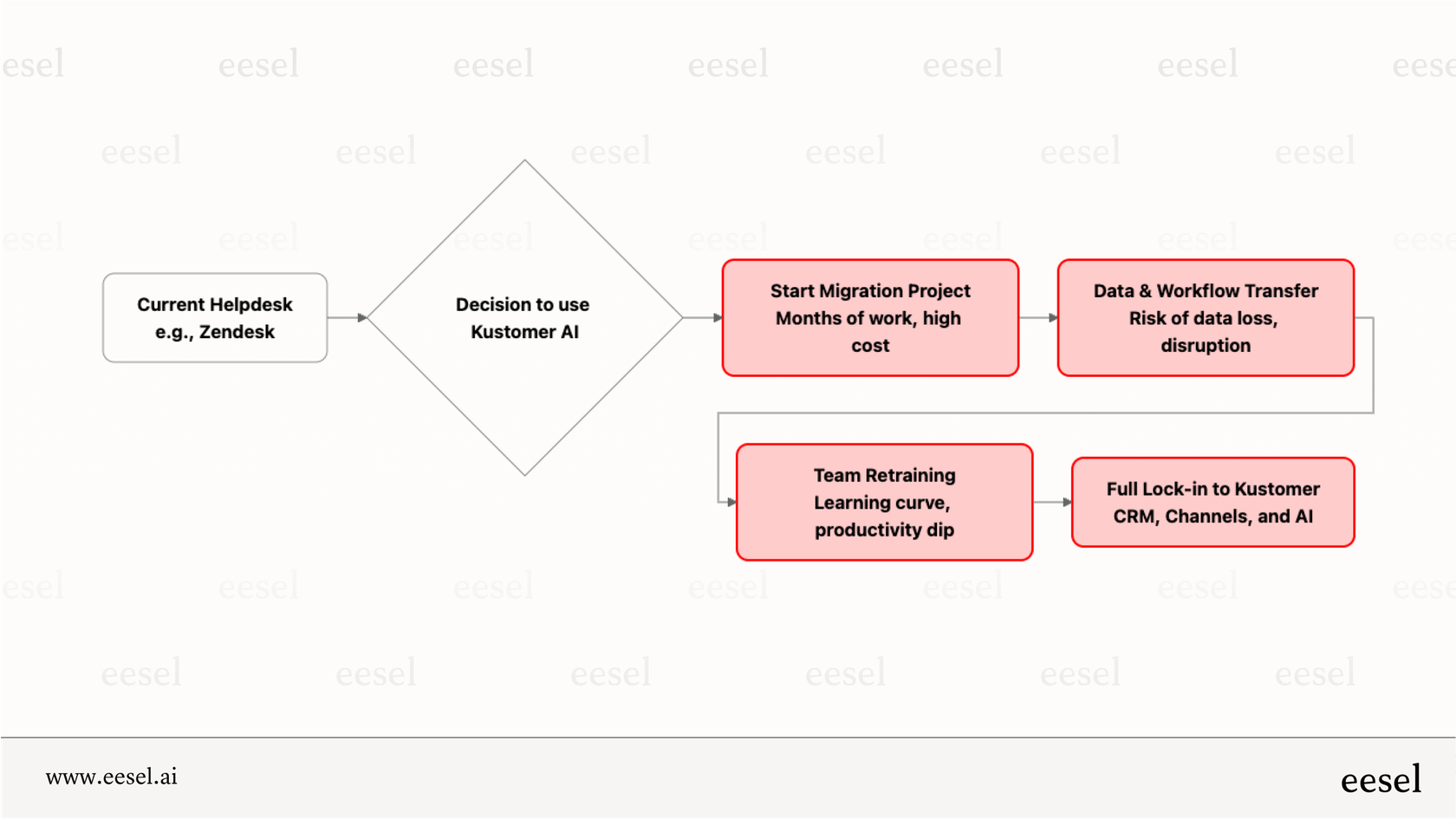
-
Migration costs: Moving your whole support setup from a platform like Zendesk or Freshdesk to Kustomer is a huge project. It can take months of work and throw your team's routine into chaos.
-
Training and adoption: Once you've moved, you have to teach everyone how to use a completely new system from top to bottom. That learning curve can slow your team down and hurt performance.
-
Loss of flexibility: You're stuck with one company for your CRM, support channels, and AI. If they decide to raise prices or their new features don't fit what you need, you don't have many options.
The power of a flexible, integration-first AI layer
Instead of the old "rip and replace" method, there's a newer approach: using an AI layer that just makes your current tools better.
This is the whole idea behind eesel AI. Here's why this approach works so well:
-
No migration needed: You can add powerful AI right on top of the helpdesk your team already uses and likes. There's no need to overhaul your main systems.
-
Faster results: You can be up and running in days, not months. Your team can start enjoying the benefits of AI automation and help almost right away.
-
De-risk your decision: With eesel AI, you can run a simulation on your past tickets before you even turn it on. This gives you a good idea of how it will perform, what your deflection rate could be, and what your return on investment will look like. Kustomer asks you to buy into their entire platform before you can even test its AI.
Choosing the right AI strategy for your team
Kustomer AI is a solid set of tools that are woven tightly into its platform. It makes the most sense for companies that are already on Kustomer or are ready to move their entire customer service team over.
It really comes down to a choice: do you want the seamless integration of Kustomer or the freedom and speed of a layered AI solution? You're deciding between an all-in-one system that requires total commitment and an adaptable AI that improves the stack you already have.
For teams that want to supercharge their existing tools with top-tier AI, a solution like eesel AI is a smarter, faster, and much less disruptive way to go. It lets you keep the helpdesk and workflows you've perfected while getting all the benefits of AI automation and agent assistance.
Ready to see how AI can improve your current helpdesk? Book a demo of eesel AI or start a free trial to see it for yourself.
Frequently asked questions
No, you cannot. Kustomer AI is designed to work exclusively within the Kustomer CRM, meaning you must migrate your entire helpdesk to the Kustomer platform to use its AI features.
Kustomer AI primarily offers two types of agents: autonomous AI agents to provide 24/7 customer support across channels and an AI copilot to assist human reps with tasks like summarizing conversations and suggesting replies.
No, the main AI features are sold as separate add-ons. You must pay extra for the AI Agent (per conversation) and the AI for Reps copilot (per user, per month) on top of your base Kustomer plan.
The biggest drawback is platform lock-in. Adopting Kustomer AI requires a full migration to the Kustomer CRM, which can be a costly and time-consuming project that eliminates your flexibility to use other helpdesk or AI tools.
Share this post

Article by
Stevia Putri
Stevia Putri is a marketing generalist at eesel AI, where she helps turn powerful AI tools into stories that resonate. She’s driven by curiosity, clarity, and the human side of technology.




